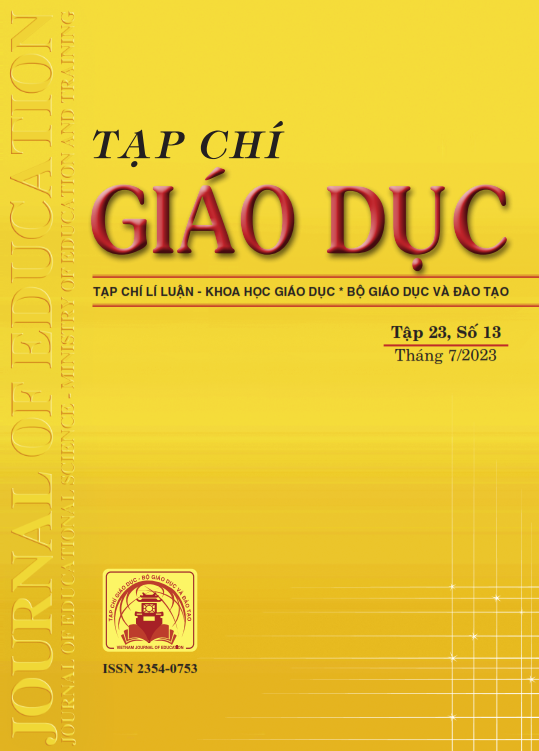Tổ chức dạy học dựa trên vấn đề bài học STEM “hiện tượng bay hơi và ngưng tụ” (Khoa học tự nhiên 6) nhằm phát triển năng lực khoa học tự nhiên cho học sinh
Tóm tắt
In the 2018 General Education Program, STEM education refers to promoting education in the fields of science, technology, engineering and mathematics, while demonstrating an interdisciplinary, students’ quality and competency-based approach. There are 3 forms of STEM education organization: STEM lessons; STEM experiences; scientific and technical research. However, when applying STEM to teaching in schools, the form of STEM lessons is rarely used. This study proposes a teaching process based on the problem of STEM lessons in order to develop students' natural science competencies and illustrates this process in teaching the STEM lesson "Volatilization and Condensation" (Natural Science 6); and at the same time, evaluating the students' natural science competence in teaching based on this STEM lesson problem. The results obtained initially show the feasibility and effectiveness of the proposed STEM problem-based teaching process in developing students' Natural Science competencies.
Tài liệu tham khảo
Barbara, J. D., Susan E. G., & Deborah, E. A. (2001). The power of problem-based learning : a practical “how to” for teaching undergraduate courses in any discipline. Sterling, Va.: Stylus Pub.
Barrows, H. S. (1996). Problem-Based Learning in Medicine and Beyond: A Brief Overview. New Directions for Teaching and Learning, 68, 3-11.
Bộ GD-ĐT (2016). Công văn số 4325/BGDĐT-GDTrH ngày 01/9/2016 về việc hướng dẫn thực hiện nhiệm vụ giáo dục trung học năm học 2016-2017.
Bộ GD-ĐT (2018). Chương trình giáo dục phổ thông môn Khoa học tự nhiên (ban hành kèm theo Thông tư số 32/2018/TT-BGDĐT, ngày 26/12/2018 của Bộ trưởng Bộ GD-ĐT).
Bộ GD-ĐT (2020). Công văn số 3089/BGDĐT-GDTrH ngày 14/8/2020 về việc triển khai thực hiện giáo dục STEM trong giáo dục trung học.
Chiu, L. (2019). Modeling competence in science education. Disciplinary and Interdisciplinary Science Education Research, pp (1-12).
Đỗ Hương Trà (2012). Các kiểu tổ chức dạy học hiện đại trong dạy học Vật lí ở trường phổ thông. NXB Đại học
Sư phạm.
Hán Thị Hương Thủy, Đỗ Hương Trà (2022). Xây dựng khung năng lực khoa học tự nhiên trong dạy học chủ đề STEM môn Khoa học tự nhiên. Tạp chí Giáo dục, 22(số đặc biệt 11), 70-76.
Norman, G. R., Schimit, H. G. (1992). The psychological basic of problem based learning: a review of the evidence. Academic Medicine.
Noushin, N., Maryam, S., William, F. M, & Mehdi, M. (2021). Proposed Teacher Competencies to Support Effective Nature of Science Instruction: A Meta-Synthesis of the Literature. Journal of Science Teacher Education, 32(6), 601-624.
Tải xuống
Đã Xuất bản
Cách trích dẫn
Số
Chuyên mục
Giấy phép

Tác phẩm này được cấp phép theo Ghi nhận tác giả của Creative Commons Giấy phép quốc tế 4.0 .












